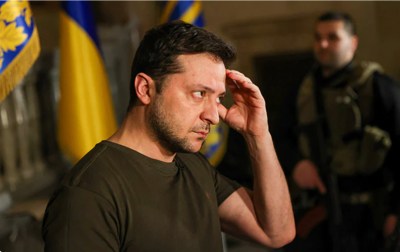JAKARTA – Defense Minister and presidential candidate Prabowo Subianto’s presumptive Ukraine peace plan may have been shot down before it got off the ground, but it is unlikely to have done him any harm among Indonesian voters who generally have an unusually sympathetic view towards Russia.
Addressing the recent Shangri-La Dialogue in Singapore, Prabowo delivered a speech that was meant to focus on Myanmar and the South China Sea, and instead dwelt in general terms on rising tensions between the US and China.
But it was the closing segment of the 18-minute address where he took a bizarre stab at acting as an international mediator, encouraged perhaps by President Joko Widodo’s adroit handling of last year’s G20 summit held in Bali.
To the bemusement of Kiev, he suggested Russian and Ukrainian forces agree on a ceasefire, establish a demilitarized zone by withdrawing 15 kilometers from their forward positions, and submit to a United Nations referendum on disputed territory.
The former three star general also recommended the UN raise a peacekeeping force to police the proposed DMZ. “Rest assured, Indonesia would be the first country to join,” he said, referencing the country’s past record of peacekeeping in Cambodia, Africa and the Middle East.
Ukraine Defense Minister Oleksii Rezkinov dismissed the proposal out of hand, saying the idea of freezing troops in position “sounds like a Russian plan, not an Indonesian plan” while adding: “We don’t need this mediator coming to us (with) this strange plan.”
European Union (EU) High Representative for Foreign Affairs and Security Policy Josep Borrell, a Spanish socialist politician, weighed in as well, telling his high-level audience there must be a “just peace”, not a “peace of surrender.”
The Indonesian Foreign Ministry was reportedly surprised and unhappy, having already signed off on a previous, carefully-crafted presentation that offered several constructive ideas on regional issues, but made only passing reference to Ukraine.
President Widodo was caught off guard too, summoning Prabowo to clarify some of the key points in the speech which implored officials gathered at Asia’s premier security summit to issue a declaration calling for an end to hostilities.
While he is on good terms with Prabowo, Widodo is having to take an even-handed stance between the Great Indonesia Movement Party (Gerindra) leader and ruling Indonesian Democratic Party for Struggle (PDI-P) candidate Ganjar Pranowo, who share top ranking in presidential opinion polls.
With nine months to go before the election, PDI-P secretary-general Hasto Kristiyanto, who is always in lockstep with party matriarch Megawati Sukarnoputri, couldn’t resist taking a swing at Prabowo, accusing him of undermining Indonesia’s official position of condemning Russia’s invasion.

Some critics compared Prabowo’s plan to a Chinese peace blueprint, largely rejected by the EU because it would allow Russian forces to maintain control over wide swathes of eastern Ukraine occupied since the February 2022 invasion.
Chinese delegates predictably saw merit in Prabowo’s plan. “I appreciate very much efforts from our friends in the region, like South Africa and Indonesia,” said Cui Tiankai, China’s former ambassador to Washington.
Sources familiar with Prabowo’s thinking say he has a soft spot for the Russian people because of their history of struggle against adversity, although that admiration apparently does not extend to President Vladimir Putin.
The original speech suggested a more prominent role for the Indonesian Armed Forces (TNI) in trying to persuade Myanmar’s military regime to accept the Association of Southeast Nations’ (ASEAN) five-point consensus plan to move back towards democratic rule.
It also called for restrictions on the size and armament of coast guard ships in the region. China’s largest vessel, which is the size of a heavy cruiser and packs a 76 mm gun, has been active around the disputed Spratly Islands and close to Indonesia’s Tuna gas block.
The Philippines Coast Guard’s 62-strong fleet includes several frigate-sized vessels and is commanded by a full admiral, compared to the navy which is only headed by a vice-admiral. Indonesia’s Coast Guard is confined to small patrol boats.
Prabowo is one of Indonesia’s few defense ministers to think strategically in deciding what equipment the TNI needs, even if the Defense Ministry doesn’t have the budget to pay for some of the expensive items on his wish list.
While Prabowo’s speech is not the first time he has gone off on a tangent, it may well have tapped into a well of support given the resentment many Indonesians hold toward the US and the West over their war on terror, which has been widely seen as a veiled war on Islam.
That feeling appears to outweigh any obvious parallels that might be drawn between Indonesia’s own history of Dutch colonialism and an imperialist Russian president trying to seize back a former colony in an act of unprovoked aggression.
It is not helped by the fact that Ukrainian leader Volodymyr Zelensky is a Jew, or that many Indonesians see Russia as partially an Islamic state because of the presence of at least 14 million, or 10% of the total population, by far the largest number in Europe.

Although previous Russian leaders often dealt brutally with Chechnya, where 95% of the inhabitants are Muslim, thousands of Chechens have fought in Ukraine and Chechen leader Ramzan Kadyrov describes Putin as Islam’s “most loyal ally and protector.”
Since coming to power in 2000, Putin has carried out a radically different policy towards Muslims than in previous eras. In 2013, he announced that Islam was an integral part of the country’s history, the first time a Russian leader had done so.
A year later, he declared: “Muslims in Russia have every right to feel they are part of the global Islamic nation, and that Moscow has been and remains a geopolitical ally of Islam.”
Turkish newspaper Al-Estiklal said last year that Putin’s rapprochement with Muslims is inseparable from his strategy of geopolitical expansion, and “the restoration of the glories of the ancient empire in its areas of influence in the Balkans and other areas with an Islamic presence.”

